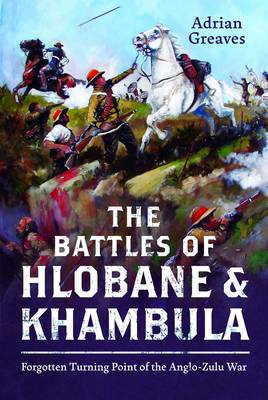
- Afhalen na 1 uur in een winkel met voorraad
- Gratis thuislevering in België vanaf € 30
- Ruim aanbod met 7 miljoen producten
- Afhalen na 1 uur in een winkel met voorraad
- Gratis thuislevering in België vanaf € 30
- Ruim aanbod met 7 miljoen producten
Zoeken
The Battles of Hlobane and Khambula
Forgotten Turning Point of the Anglo-Zulu War
Adrian Greaves
Hardcover | Engels
€ 34,95
+ 69 punten
Omschrijving
The two main Zulu War battles of Hlobane and Khambula were fought on consecutive days, 28 and 29 March 1879, with very different outcomes. The first, a bungled raid to deprive the Zulus of vital cattle, ended in a humiliating debacle due to poor planning and reconnaissance. The latter saw the outnumbered British first repulse the counterattack against their camp and then unleash their cavalry to turn the Zulu withdrawal into a bloody rout, thus sealing the first decisive British victory of the war. As Adrian Greaves contends in his exciting account, this change in fortunes made Khambula the most important battle of the war, since it persuaded both Lord Chelmsford and the Zulu king, Cetshwayo, that the British could defeat the Zulus. Yet, despite their importance, these linked encounters have been neglected by historians due mainly to their inaccessibility and dangerous terrain.
Both battles are described in the fullest detail possible, drawing on eyewitness testimony and meticulous research and benefitting from the author's twenty-five years' experience of leading guided tours of the battlefields and surrounding terrain. He recounts tales of extraordinary courage but also exposes blunders and cowardice that tarnish some famous reputations. Colonel (later Field Marshal) Wood in particular comes out badly. This is an essential, eye-opening book for anyone with an interest in the Anglo-Zulu War.
Both battles are described in the fullest detail possible, drawing on eyewitness testimony and meticulous research and benefitting from the author's twenty-five years' experience of leading guided tours of the battlefields and surrounding terrain. He recounts tales of extraordinary courage but also exposes blunders and cowardice that tarnish some famous reputations. Colonel (later Field Marshal) Wood in particular comes out badly. This is an essential, eye-opening book for anyone with an interest in the Anglo-Zulu War.
Specificaties
Betrokkenen
- Auteur(s):
- Uitgeverij:
Inhoud
- Aantal bladzijden:
- 224
- Taal:
- Engels
Eigenschappen
- Productcode (EAN):
- 9781036130589
- Verschijningsdatum:
- 28/04/2026
- Uitvoering:
- Hardcover
- Formaat:
- Genaaid
- Afmetingen:
- 159 mm x 235 mm

Alleen bij Standaard Boekhandel
+ 69 punten op je klantenkaart van Standaard Boekhandel
Beoordelingen
We publiceren alleen reviews die voldoen aan de voorwaarden voor reviews. Bekijk onze voorwaarden voor reviews.







